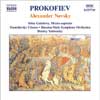Prokofiev Alexander Nevsky; Scythian Suite
Gergiev bested by a super-budget rival
View record and artist detailsRecord and Artist Details
Composer or Director: Sergey Prokofiev
Genre:
Vocal
Label: Philips Classics
Magazine Review Date: 6/2003
Media Format: CD or Download
Media Runtime: 60
Mastering:
Stereo
DDD
Catalogue Number: 473 600-2PH

Tracks:
| Composition | Artist Credit |
|---|---|
| Alexander Nevsky |
Sergey Prokofiev, Composer
Kirov Chorus Kirov Orchestra Olga Borodina, Mezzo soprano Sergey Prokofiev, Composer Valery Gergiev, Conductor, Bass |
| Scythian Suite |
Sergey Prokofiev, Composer
Kirov Orchestra Sergey Prokofiev, Composer Valery Gergiev, Conductor, Bass |
Composer or Director: Sergey Prokofiev
Genre:
Opera
Label: Naxos
Magazine Review Date: 6/2003
Media Format: CD or Download
Media Runtime: 66
Mastering:
Stereo
DDD
Catalogue Number: 8 555710

Tracks:
| Composition | Artist Credit |
|---|---|
| Alexander Nevsky |
Sergey Prokofiev, Composer
Dmitry Yablonsky, Conductor Irina Gelahova, Mezzo soprano Moscow Stanislavsky Th Chorus Russian State Symphony Orchestra Sergey Prokofiev, Composer |
Author: David Fanning
Yet had I bought this CD I doubt if I would have considered it money well spent. Gergiev’s rhythmic control and the layering of the complex textures in the Suite are admirable, but despite splendid moments such as the rampant horns in the second movement (‘The Enemy God and the Dance of the Spirits of Darkness’) there is little sense of relish for the task in hand. The impression is of a rehearsal rather than of a real performance, of the music’s claws having been clipped rather than sharpened. In the Cantata my disappointment is even more intense. The amazing opening bars are only vaguely coloured, and there is no atmosphere of oppression whatsoever (the music represents ‘Russia under the Mongol yoke’). Olga Borodina is predictably rich-toned in ‘The Field of the Dead’, but neither before, during nor after the ‘Battle on the Ice’ do the chorus give the impression of their hearts and minds being fully engaged; frankly they sound under-staffed and under-rehearsed.
For the Suite the acoustic of the Martti Talvela Hall in Mikkeli, Finland sounds dry and congested, with everything rather huddled into the foreground. The Cantata is more successfully recorded, in the Moscow Conservatory. It would surely have been nice had the booklet essay found room to tell the stories of the originalballet and film; and the unfortunate reference to Khachaturian’s ‘Ritual Fire Dance’ – admittedly the sort of gaffe anyone can make – is something an editor should surely have spotted.
The chorus is also something of a weak link in the otherwise greatly superior Yablonsky account of Nevsky for Naxos, although they do at least sound more involved than their Kirov counterparts. The trouble here is that the tenors in particular are rather under strength and sometimes under the note too. A pity this, because Yablonsky gets far more colour and sense of drama from his players than does Gergiev; the central Battle scene in particular conveys real expectation and menace, though there are also passages where the strings lack depth. Irina Gelakhova is more heart-on-sleeve thanBorodina, though not necessarily more moving.I confess that my inability to surrendercompletely to this version may have something to do with the stunning performance from the BBC Philharmonic and Sir Edward Downes I heard in concert only a few weeks earlier. On CD that kind of intensity has only been supplied, in my experience, from Svetlanov (last heard of, I believe, on Chant du Monde, 6/87), though among current versions Järvi probably comes closest.
The couplings on Naxos are carefully chosen from the three projects Prokofiev was involved in at the time of the Pushkin centenary in 1937, the year before his work on Nevsky. For these he drew on the idiom of recent scores such as Romeo and Juliet; then, when the Pushkin projects foundered in the paranoid climate of the Stalin Terror, he reused some of the material in wartime works such as the Eighth Piano Sonata and War and Peace. Serious Prokofievians will need the full version of Eugene Onegin on Chandos and, if they can find them, the more extensive selections from Boris Godunov and the 1938 Hamlet on Consonance. Nevertheless Naxos offers a well-planned and by and large admirably executed and recorded disc, to which the ‘Dance of the Oprichniks’ from Ivan the Terrible makes a rousing conclusion.
Discover the world's largest classical music catalogue with Presto Music.

Gramophone Digital Club
- Digital Edition
- Digital Archive
- Reviews Database
- Full website access
From £8.75 / month
Subscribe
Gramophone Full Club
- Print Edition
- Digital Edition
- Digital Archive
- Reviews Database
- Full website access
From £11.00 / month
Subscribe
If you are a library, university or other organisation that would be interested in an institutional subscription to Gramophone please click here for further information.




